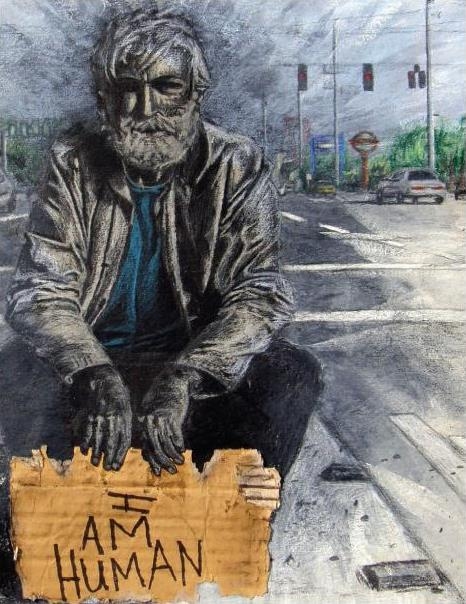A while back I wrote about how confrontational evangelism turns way more people away from Jesus than toward Him. Below is a Facebook account of exactly what I was talking about.

Liberating you from bad ideas about God
Stop relying on pastors and Bible teachers to tell you what the Bible means.
Read this book and learn to study the Bible for yourself. Available now on Amazon.
The book discussion questions with each chapter to make it perfect for a home study group. There is also a LONG appendix on how to understand the violent passages in Scripture.
A while back I wrote about how confrontational evangelism turns way more people away from Jesus than toward Him. Below is a Facebook account of exactly what I was talking about.

 In a recent post on evangelism, an African evangelist posted some comments that I though were quite good. His name is Godfrey Mawa, and here is what he wrote about how western missionaries often spend money on their African mission trips (I edited his comments somewhat for this post):
In a recent post on evangelism, an African evangelist posted some comments that I though were quite good. His name is Godfrey Mawa, and here is what he wrote about how western missionaries often spend money on their African mission trips (I edited his comments somewhat for this post):
Your thoughts are great and there are very few people who have such a heart and who are willing to help native missionaries to impact their villages, cities and nations.
I agree with what you wrote: native African missionaries are more effective than visiting missionaries. I can’t be more effective than a trained American evangelist in reaching Americans for Christ as many barriers will hinder me from efficiency.
Over the span of the past years, I have seen many missionaries spend hundreds of thousands of dollars on air flights, expensive hotel bills, and other expenses. Yet in Africa, $10,000 will do a significant evangelistic work, or buy land for a school project, an orphanage or anything that can add value to the kingdom of God.
Nevertheless, some Christian relief missionaries will spend $100,000 to bring in donations worth $1,000 . I saw this during our recent mission to the war-torn Northern Uganda (in response to Joseph Kony and LRA rebels insurgencies/atrocities that lasted for over 20 years). It was not uncommon to see a missionary using a private jet, spending their stay on safaris and first-class hotels, while they give one-time foodstuffs and used clothes as donations. Of course, while they are handing out the food and clothing, they also take lots of good pictures and videos for their Praise Reports.
I have evaluated that, as a native African missionary, my team and I can do more effective work in evangelism with $10,000 than a visiting missionary can do with $100,000.
A lot of churches in the developed world believe in their own trained missionaries and that’s why they would rather spend the larger amount. There is some legitimacy to their concern. Sometimes they have heard of or dealt with the wrong native persons before examining or training them, and these native African missionaries have disappointed them. This has killed the trust for native African missionaries. Nevertheless, there are still great native African missionaries who will work unto changing their communities and people towards the values of Christ.
My prayer is that churches and missionaries will use God given resources with good stewardship, as evangelism yields amazing fruits. The needy orphans, widows and helpless people helped and nations changed with a holistic approach. That way, the Lord will be praised! The nations will declare His praises.
At my request for more information about his missionary team, he sent in this information:
I am available to advise any missionaries interested in doing a mission work in Africa on how to be cost effective, yet with great results/fruits for the Lord’s kingdom. We have diverse experience ranging from all forms of evangelistic missions, relief and aid, leadership training and development, orphans, widows and the elderly, awareness and sensitization, among others. You can also see some pictures on our mission website or the following Facebook links;
https://www.facebook.com/malipuko
https://www.facebook.com/godfreymawa
https://www.facebook.com/afrikidzuganda
https://www.facebook.com/pages/Commission-International/114524275303169Our organization has opportunities for individuals or groups of those interested in coming for mission experience in Africa.
I am doing to get you a list of advise for missionaries coming to Africa or third world countries, with an effective mission yet, without wasting finances and resources.
Thanks again Jeremy, for the great work. I know many are going to be helped.

Please note that I am not “endorsing” Godfrey’s African mission. He and I have never met and I have never worked with him in doing any sort of missions in Africa. I have posted his information because he validates what I have found to be true in my own experience, and what I have read in numerous other books about the best and most cost-effective way of doing evangelism and missions in other countries, especially in places like Africa.
What books?
Here’s two:
When Helping Hurts
The Spontaneous Expansion of the Church

This is a little follow up post from yesterday where I said that Jesus did not in fact speak of hell more than heaven. Note that if what I proposed is true, then most of the passages in the Gospels that people think refer to hell, do not actually refer to hell.
If that is true, then there are very few passages in Scripture which do teach about hell! In fact, there may be only two or three.
And these rare passages use highly symbolic terminology which tells us that we basically know nothing about hell.
One Bible teacher whom I used to listen to a lot, believes that hell is in the center of the earth. His argument is that when the Bible talks about the grave, it uses terminology about people going down into the earth, and therefore, hell must be in the earth. I find this almost laughable, for it shows a complete disregard for biblical imagery and symbolic terminology. “Going down into the earth” refers to getting buried and returning to dust, not going to hell.
Anyway, the few passages which do in fact refer to a place of punishment speak of flames and a Lake of Fire. Does this mean that hell will actually be a place that is burning? I could be wrong, but I really doubt it.
Fire in Scripture, when used symbolically, always refers to judgment. Hell is simply going to be a place of judgment, and it is usually temporal in nature.
Hell will not be a place of torture or torment as depicted in the 1997 Science Fiction movie Event Horizon (If you haven’t seen that movie, I don’t recommend it. It’s about a group of space travelers that travel to hell. And hell is very graphically depicted in the movie.)
 So since hell is not a place where God tortures people for eternity, I almost literally shake with anger when I read these words that Jonathan Edwards preached:
So since hell is not a place where God tortures people for eternity, I almost literally shake with anger when I read these words that Jonathan Edwards preached:
The God that holds you over the pit of hell, much as one holds a spider, or some loathsome insect over the fire, abhors you, and is dreadfully provoked: his wrath towards you burns like fire; he looks upon you as worthy of nothing else, but to be cast into the fire; he is of purer eyes than to bear to have you in his sight; you are ten thousand times more abominable in his eyes, than the most hateful venomous serpent is in ours. You have offended him infinitely more than ever a stubborn rebel did his prince; and yet it is nothing but his hand that holds you from falling into the fire every moment.
Aside from his abhorrent view of hell, Edwards reveals a monstrous view of God and a despicable view of men. Forgive me for saying it, but this kind of evangelism can go to hell.
What is hell going to be like? Scripture doesn’t give us much indication.
Personally, I see a lot biblical and theological merit to the way C. S. Lewis portrayed it in his book The Great Divorce. He claimed he was not writing a theology of hell in this book, but I suspect he said that just to keep people from calling him a heretic. He pictures hell as a place where people live and exist because they want to, and where everybody gets exactly what they want. It is not torture. In that book, he wrote this:
There are only two kinds of people in the end: those who say to God, “Thy will be done,” and those to whom God says, in the end, “Thy will be done.” All that are in Hell, choose it. Without that self-choice there could be no Hell. No soul that seriously and constantly desires joy will ever miss it. Those who seek find. Those who knock it is opened.
Lewis wrote elsewhere that the doors of hell are locked from the inside.
If you think about what life would be like if everybody got exactly what they wanted, it would be hell. Eventually, people couldn’t stand to be around each other. The longer they are there, the most disconnected they would become. In this sense, hell, ultimately, is eternal loneliness. It is eternal separation from God and others.
That, of course, is pretty hellish, but it is not the same as God torturing us for all eternity. Instead, it is God granting our desire to live apart from Him and live our lives exactly as we please.
Anyway, I will write a lot more about this when I get to the subject of hell in the current book I am writing on the violence of God, but I wanted to just give a short preview of my views on hell, and provide a follow-up from the post yesterday about whether Jesus spoke of hell more than heaven.
 I sometimes hear pastors and teachers say that Jesus talked about hell more than heaven, and so we should do the same in our evangelism.
I sometimes hear pastors and teachers say that Jesus talked about hell more than heaven, and so we should do the same in our evangelism.
In other words, it is is often suggested that Jesus “scared” people into the kingdom. He threatened people with hell if they didn’t believe in Him, and so in our evangelism, we are perfectly justified in using threats of burning forever in hell and other similar scare tactics to get people into the Kingdom of God as well.
And it isn’t just the wacko fringe Christians who say this. I have heard it preached from the pulpits of some relatively “sane” evangelical churches. This sort of approach is also quite common in some of the leading evangelistic approaches of our day. People are trained to tell others that God is holy, righteous, and good, and since one sin is enough to condemn us to hell, God is justified in sending us there if we don’t believe in Jesus for eternal life.
And rather than shying away from hell, we are told to use it as a way to invite people into heaven. After all, we are told, Jesus preached about hell more than heaven, and so should we.
But is this true?
In my book I am currently writing on the violence of God in the Bible, I will be including a full chapter on what the Bible says about hell, and the vast majority of that chapter will find its way here to this blog.
But by way of preview (and because the topic of this month’s synchroblog is hell), here are some of the main points I will be writing about in that chapter:
Jesus does speak about “fire” several times in the Gospels (e.g., Matt 3:10-12; 7:19; 13:40-50; John 15:6). But these references to fire are not references to a place of eternal torture for the unredeemed, but are simply symbols of temporal discipline and destruction that come upon some people as a result of straying from God’s instructions. Fire can even be for purification of believers (the Greek word for fire is pur) as seen in 1 Corinthians 3:15.
Sometimes Jesus refers to “hell fire” (e.g., Matt 5:22), but these are actually references to “Gehenna,” which I discuss in a later point.
The few references where fire may refer to the everlasting flames of hell are places like Matthew 25:41, and are used in reference to a place created for Satan and his angels. Do some humans end up there? It appears so, but again, this will not be for torture and torment. To explain why will have to wait for the book…
There are several instances in Matthew where Jesus refers to “the outer darkness” and “weeping and gnashing of teeth” (Matt 8:12; 13:42-50; 22:13; 24:51; 25:30). These terms are sometimes used in connection with fire and so most people think they also refer to hell.
But they don’t.
A careful contextual study of most of these texts reveal that the image of “outer darkness” is a symbol of exclusion from blessing and honor, and the image of “weeping and gnashing of teeth” is a vivid symbol of deep and profound regret. The events discussed in these places are typically events that will take place at the Judgment Seat of Christ (which is only for believers) and the Wedding Supper of the Lamb (which is also only for believers).
Again, I need full studies to show this, and these will have to wait for my book…
There are numerous references in the Greek New Testament to hades and gehenna, and regrettably, most English translations translate these words as “hell.” But a place of eternal, conscious torment is what modern people think of when they think of hell, this is not what first century Jewish people would have thought of when they heard the words hades and gehenna.
Hades, of course, is the ancient Greek god of the underworld, the god of death. In biblical usage, it is often a Greek translation from the Hebrew sheol, which means “the pit” or “the grave.” Neither of these are references to hell, but simply refer to the hole in the earth in which dead people are laid (cf. Acts 2:27, 31; Rev 20:13).
There is, of course, the story about the rich man and Lazarus in Luke 16:19-31, which seems to equate hades with torturous flames in a pit of hell. But there are numerous problems with understanding this text as referring to what really happens to people after they die (for example, Lazarus is there with the rich man and they can communicate), and so it is dangerous to take this text to literally.
F inally, Gehenna refers to an actual place that existed outside the gates of Jerusalem. It was a little valley in which trash was thrown to be burned. This imagery must be understood wherever Jesus talks about “hell fire” and uses Gehenna (cf. Matt 5:22).
inally, Gehenna refers to an actual place that existed outside the gates of Jerusalem. It was a little valley in which trash was thrown to be burned. This imagery must be understood wherever Jesus talks about “hell fire” and uses Gehenna (cf. Matt 5:22).
And do I need to say it? … Yes, I know a fuller explanation is wanted on all these terms and texts, but it will have to wait for the book…
When all of this is considered, we see that Jesus didn’t talk about hell more than heaven. He rarely mentions hell at all. As such, I think there is absolutely no place for threatening people with hell if they don’t believe in Jesus for eternal life. Yes, we can warn people (as Jesus did) about the disastrous temporal consequences of their sin, but threatening people with eternal torment in flames is neither Christlike nor theologically correct.
To say that Jesus warned people of hell and so should we is just plain wrong.
Having said all this, Jesus really didn’t talk that much about heaven either.
Just as we don’t really want to scare people into believing Jesus, we shouldn’t try to bribe them either. While Jesus talks about heaven more than hell, neither have a big emphasis in His teaching.
Instead, Jesus frequently talks about everlasting life, and life in the kingdom of God. Eternal life, of course, begins the moment we believe in Jesus for it, but the longer we live in Him, the great the experience of eternal life gets.
And the Kingdom of God (or the Kingdom of Heaven) is not a synonym for heaven, but simply refers to the rule and reign of God in our lives.
If you want to evangelize, and you want follow the way of Jesus and the apostles, you don’t need to threaten or bribe. Simply lay out the grand vision of what life is like when we live it God’s way. Life under the rule and reign of God is a life of joy, freedom, contentment, fulfillment, and satisfaction. It is a life of laughter and delight. It is a life free from bondage and slavery and addiction. It is life as it was truly meant to be lived.
This is the life Jesus lived, and this is the life Jesus invited people into. If we want to evangelize others like Jesus, we don’t need to threaten them with hell or bribe them with heaven, but can simply invite them into a way of life is that is better than anything else the world has to offer.
This post is part of the May Synchroblog on the topic of hell. Below is a list of the other bloggers who participated this month. Go read what they have to say on the topic of hell.
 Who are the homeless? What are they thinking as we walk by without looking them in the eye? What do they want from us as they hold their sign at the stoplight while we fiddle with the radio knobs on our car dashboard?
Who are the homeless? What are they thinking as we walk by without looking them in the eye? What do they want from us as they hold their sign at the stoplight while we fiddle with the radio knobs on our car dashboard?
Do the homeless have dreams? Desires? Wishes? Hopes?
What circumstances in life led them to this spot on the cold, wet pavement under the bridge?
If we want to help the homeless, the very first step is seeking to understand who they are and how they think. The best way to do this is by listening to their stories.
Here are a few of the stories I have heard from homeless people in my town as I spent Easter Sunday among them:
“I have a dream,” said the homeless woman sitting on the sidewalk. “I have a dream that I will have a large house that I can fill with children, the unwanted, unloved, and abused children of the world.
“There’s a little five year old girl I know. She gets passed around and used by men.
“There’s also a baby. He can sit up, so someone sets him out on the front steps of the apartment building where he lives. Sometimes people give him something to eat or drink. He’s in the sun when it’s hot. Sometimes he falls over and falls down the steps and gets hurt and cries. If he’s lucky, someone sets him up again.”
“Where’s his mother?” I ask.
“I don’t know. I’ve asked people who she is and no one knows. They say he’s just out there when they come out the door and they never see anyone take care of him. I want to give him a home.
“The innocents. The Lord gave me the word innocents. I asked him who the innocents are. He told me they are the children no one wants. I pray for them. Will you pray for them?”
We assure her we will.
We walk around the corner to a group of homeless women sitting under tarps. “Melinda” was busy working on something on the sidewalk.
“I saw you coming down the street and I’m making this for you.” Somewhere Melinda had come up with a small pink foam cross and foam stickers in the shape of hearts, churches, and the words “Joy”, “Pray,” and “Love God.”
“Jesus rose up from the dead on Easter,” Melinda told us. “Here, this is for you to remind you of that. Would you like some tickets to a movie? It’s about a girl that got hurt, but God helped her in all her trouble. I have two extra tickets.”
We accept the tickets and thank her, and give her and her friends water, food, and shirts.
“Happy Easter!” they shout as we walk on to another group of homeless people.
Yes, the risen Lord walks among the homeless, not only on Easter, but also on every day of the week. He is there, among the beauty of those who know and love him, but also in the middle of incredible darkness.

“Six homeless men have been murdered down here lately,” said our friend “Arthur”. We’ve known Arthur for several years. He dreams of starting a business and getting off the street.
So far it hasn’t happened.
“One night I was coming back to my cart and there was a dead man laying right there,” Arthur said, pointing to a small patch of ground planted with bushes. “Someone had bashed in his head and his brains were all over the place.”
“Are you afraid?” I ask.
“Sure, but this is all I got. So far I’ve been lucky, I guess.”
“Drug deal gone bad?” I ask.
“Maybe. I dunno. I was walkin’ around for a couple of hours. It was late and there he was when I came back.”
“Why doesn’t this stuff get in the paper, Arthur?”
“Nobody cares when one of us gets murdered. It’s bad publicity for the city.”
“We care, Arthur.”
“We know. You show it.”
Incredible beauty walks among the homeless, but incredible evil also is their constant companion.
With my little pink cross held in my hand, we round the corner a couple of hundred feet from where the man had been murdered a few weeks before.
“Them damn cops won’t let us play football there in the street,” a couple of them tell me.
“Why not?” I ask.
“We don’t know, but they’re gonna pay for it.”
 A group of about twenty angry homeless men are milling around. One police cruiser with one policeman inside backed into place in the middle of the street in front of them. The policeman rolled down his window, then opened his door, got out and stood there, facing off with the men.
A group of about twenty angry homeless men are milling around. One police cruiser with one policeman inside backed into place in the middle of the street in front of them. The policeman rolled down his window, then opened his door, got out and stood there, facing off with the men.
“Friends, we have sweet grapes, water, and buffalo-wing flavored goldfish crackers for you” we announce as we purposely walk between the policeman and the group of angry men. “Who needs a fresh, clean shirt? I have a bag of them here. My wife even ironed them for you.”
Soon we are handing out food, water, and shirts and the mood of the crowd changes. Only one man continues to taunt and curse the policeman. The policeman tells him to calm down, then returns to the safety of his cruiser while the crowd sat, eating grapes and crackers. Some tried on their new shirts.
“This is Easter,” we proclaim. “Have a good Easter, guys.”
“Happy Easter!” several tell us.
None of these men mentioned Jesus rising from the dead and no one gave us an Easter cross. But no one jumped the policeman and no one got shot, either.
Jesus walks the streets. He’s on the corner with the prostitutes. He’s in the alley with the addicts. He walks the streets on Easter morning and on every other morning.
People are murdered there on the street, but others are safe. Jesus is with them both.
Some mothers set their babies on the front steps of their apartment buildings and leave them alone. Other mothers make plans to get off the streets and make a home for the unwanted and unloved children. Jesus cries with and comforts both.
The homeless have dreams … and Jesus dreams along with them.
We see Jesus walking these streets. Have you seen him there? We see him every week walking these streets. He’s not hard to find if you know how to look.
And YOU can help.
Fill out the form below to receive several emails about how to love and serve the poor and homeless.
(Note: If you are a member of RedeemingGod.com, login and then revisit this page to update your membership.)
